
Bruce Bower has written about the behavioral sciences since 1984. He often writes about psychology, anthropology, archaeology and mental health issues. Bruce has a master's degree in psychology from Pepperdine University and a master's degree in journalism from the University of Missouri. Following an internship at Science News in 1981, he worked as a reporter at Psychiatric News, a publication of the American Psychiatric Association, until joining Science News as a staff writer. In 1996, the American Psychological Association appointed Bruce a Science Writer Fellow, with a grant to visit psychological scientists of his own choosing. Early stints as an aide in a day school for children and teenagers with severe psychological problems and as a counselor in a drug diversion center provided Bruce with a surprisingly good background for a career in science journalism.

Trustworthy journalism comes at a price.
Scientists and journalists share a core belief in questioning, observing and verifying to reach the truth. Science News reports on crucial research and discovery across science disciplines. We need your financial support to make it happen – every contribution makes a difference.
All Stories by Bruce Bower
-
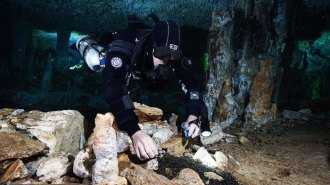 Humans
HumansUnderwater caves once hosted the Americas’ oldest known ochre mines
Now-submerged chambers in Mexico’s Yucatán Peninsula contain ancient evidence of extensive red ochre removal as early as 12,000 years ago.
-
 Psychology
PsychologyMonkeys may share a key grammar-related skill with humans
A contested study suggests the ability to embed sequences within other sequences, a skill called recursion and crucial to grammar, has ancient roots.
-
 Genetics
GeneticsDNA from a 5,200-year-old Irish tomb hints at ancient royal incest
Ruling families in Ireland may have organized a big tomb project, and inbred, more than 5,000 years ago, a new study suggests.
-
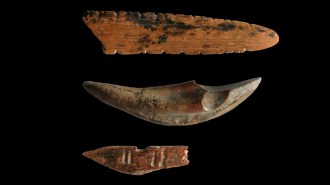 Archaeology
ArchaeologyClues to the earliest known bow-and-arrow hunting outside Africa have been found
Possible arrowheads at a rainforest site in Sri Lanka date to 48,000 years ago.
-
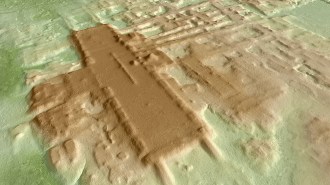 Humans
HumansLidar reveals the oldest and biggest Maya structure yet found
A previously unknown Maya site in Mexico, called Aguada Fénix, adds to evidence that massive public works may have preceded kings in the civilization.
-
 Humans
HumansThe Dead Sea Scrolls contain genetic clues to their origins
Animal DNA is providing researchers with hints on how to assemble what amounts to a giant jigsaw puzzle of ancient manuscript fragments.
-
 Archaeology
ArchaeologyA biblical-era Israeli shrine shows signs of the earliest ritual use of marijuana
Chemical analyses reveal a residue of cannabis and animal dung on an altar from a biblical-era fortress in use more than 2,700 years ago.
-
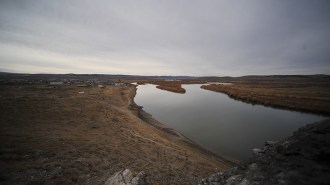 Genetics
GeneticsThe oldest genetic link between Asians and Native Americans was found in Siberia
DNA from a fragment of a 14,000-year-old tooth suggests that Native Americans have widespread Asian ancestry.
-
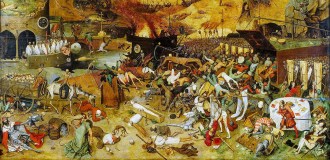 Science & Society
Science & SocietyPast plagues offer lessons for society after the coronavirus pandemic
Starting with the Roman Empire, societies have often dealt resiliently with deadly pandemics.
-
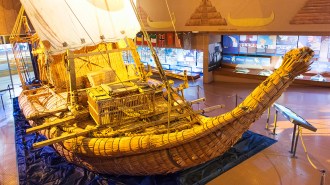 Archaeology
Archaeology50 years ago, explorer Thor Heyerdahl’s Atlantic crossing hit a snag
Explorer Thor Heyerdahl followed an aborted Atlantic voyage with a second trip that indicated ancient Egyptians could have traveled over long distances by sea.
-
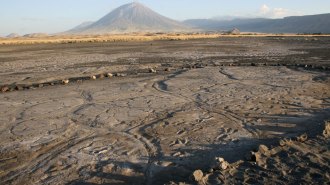 Anthropology
AnthropologyAfrica’s biggest collection of ancient human footprints has been found
Preserved impressions in East Africa offer a glimpse of ancient human behavior.
-
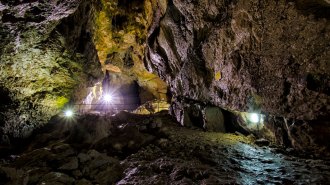 Anthropology
AnthropologyThe earliest known humans in Europe may have been found in a Bulgarian cave
New finds from Bulgaria point to a relatively rapid expansion of Homo sapiens into Eurasia starting as early as 46,000 years ago, two studies suggest.